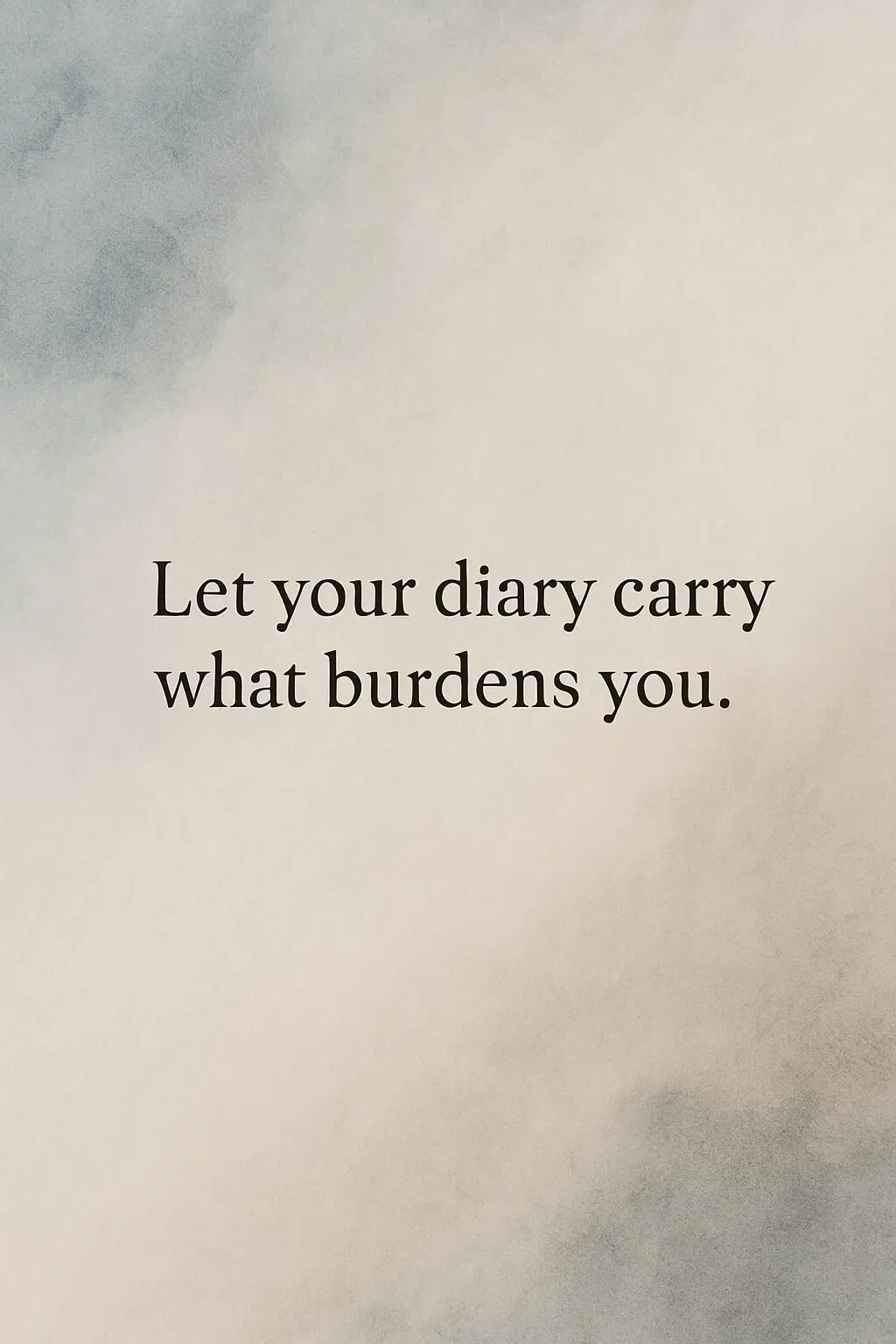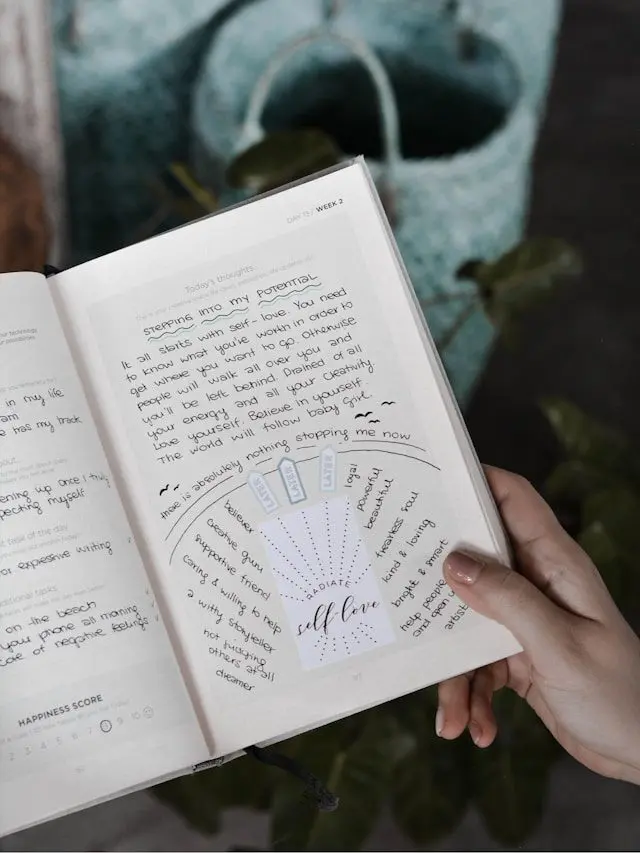Anxiety affects 40% of Americans today. Writing in a journal can help you deal with these difficult feelings. A journal gives you a private place to think about your feelings, work through your emotions, and plan for the future. This guide shows you 50 different journaling prompts for anxiety to help you explore your thoughts, make sense of your emotions, and feel more peaceful.

Prompt Definition | Self-Reflection | Processing Emotions | Identifying Triggers | Positive Affirmations | Mindfulness and Presence | Problem Solving | Visualizations | Letting Go | Planning for the Future | Expressive Writing | Takeaway
What are journaling prompts for anxiety?
Journaling prompts for anxiety are guided questions and statements designed to help individuals explore, express, and manage anxious thoughts. By writing responses to targeted prompts—such as “What am I feeling right now?” or “What evidence supports my worry?”—users gain clarity, reduce rumination, and build coping strategies over time.
Self-Reflection Journaling Prompts
Self-reflecting in your journal helps you explore your thoughts, spot your strengths, and find things to be thankful for. This shifts your focus from worries to positives, lowering your anxiety. For example, writing about past successes reminds you that you can handle tough situations. Individuals who regularly engage in self-reflective journaling also report lower blood pressure and an improved mood.
- What are three things I feel grateful for today?
- What’s a recent situation where I felt calm, and why?
- What are my biggest worries right now, and what can I do about them?
- What are five qualities I like about myself?
- How have I successfully handled a stressful situation in the past?
Processing Emotions Journaling Prompts
Writing down your feelings helps you sort and understand overwhelming thoughts. Journaling works like exposure therapy: facing worries on paper weakens their power over you. It uncovers specific triggers and patterns. Research shows expressive writing cuts anxious rumination, sharpens memory, and eases stress, making anxiety easier to manage each day.
- What am I anxious about today, and what can I tell myself about these anxieties?
- What emotions am I feeling right now, and why?
- When do I feel most at peace, and how can I bring more of that into my life?
- What’s weighing heavily on my mind, and how can I address it?
- Describe a recent dream and how it might relate to my anxieties.

Identifying Triggers Journaling Prompts
Writing down what causes your anxiety is essential for developing ways to cope with it. When you journal about your triggers, you can spot specific situations, places, or relationships that increase your stress.
Once you understand these triggers, you can either avoid them or prepare yourself to handle them with specific coping strategies. Regular documentation and review of your triggers reveals patterns, allowing you to adjust your lifestyle or reactions and gain more control over your anxiety.
- What triggers my anxiety, and how can I prepare for these triggers?
- Are there patterns in my anxiety that I can identify and address?
- How does my body feel when I’m anxious, and what does this tell me?
- Who in my life enhances my calm, and why?
- What times of day am I most anxious, and what routines can I alter at these times?

Positive Affirmations Journaling Prompts
Writing positive statements about yourself in your journal builds self-worth and fights the negative thoughts that come with anxiety. Regular practice helps train your brain to focus on positive thoughts, making you more mentally resilient to stress. This practice develops a growth mindset, which is key to managing anxiety.
Research using brain scans shows that positive affirmations activate parts of your brain connected to positive self-image and emotional control. When you regularly write and reflect on positive affirmations, you develop a more optimistic outlook and reduce your anxiety.
- Write down three affirmations that make me feel stronger.
- What strengths can I draw on when I’m feeling anxious?
- What have I accomplished recently that I can celebrate?
- Who supports me unconditionally, and what have they told me that I found encouraging?
- What am I looking forward to in the next week?
Mindfulness and Presence Journaling Prompts
When you journal with mindfulness, you focus on the present moment and recognize that anxious thoughts come and go. This approach asks you to observe your surroundings and feelings in detail without judging them, which creates a sense of calm.
Mindful journaling helps you separate yourself from worries about the past or future, teaching you to appreciate what’s happening right now. The practice improves your concentration, reduces repetitive negative thoughts, and decreases physical symptoms of stress.
- What can I see, hear, smell, taste, and touch right now?
- What mindfulness exercises help me calm down, and why do they work?
- How can I incorporate the benefits of mindfulness into my daily routine?
- Describe a place where I feel safe and calm.
- How does being present affect my anxiety?

Problem Solving Journaling Prompts
When you journal, you break problems into smaller, manageable parts. Regularly writing down problems and solutions clears your mind and eases overwhelm. This process organizes thoughts and builds confidence to face challenges. Focusing on solutions instead of worries helps you regain control. Studies find writing to solve problems eases depression.
- What is one small step I can take today to reduce my anxiety?
- What are some solutions to a problem I’m currently facing?
- How can I break down a big project I’m anxious about into manageable steps?
- What resources do I have to cope with stress?
- Who can I reach out to for support with my anxieties?
Visualizations Journaling Prompts
Visualization journaling invites you to describe detailed mental images of calm places or successful moments. By writing these scenes, you train your mind to focus on positive outcomes, lower stress reactions, and ease anxious thoughts. Regularly practicing imagery in writing reduces stress hormones and builds lasting emotional resilience each day.
- Visualize a day without anxiety. What does it look like?
- Picture a relaxing scene. What details can I add to make it more vivid?
- Imagine a conversation with my anxiety. What would I say?
- Envision achieving a goal. How do I feel in that moment? What are the ways to reward myself?
- What does my ideal calm day involve?
Letting Go Journaling Prompts
Letting go journaling prompts ask you to explore and release negative thoughts and emotions. Writing down what you need to let go frees mental space, reduces rumination, and lightens emotional burdens. This practice shifts focus from what you can’t control to healing acceptance. Studies show letting-go writing lowers anxiety levels.
- What am I holding onto that I can let go of?
- Write a letter to my anxiety explaining how I wish to overcome it.
- What are unhelpful thoughts that I can challenge and reframe?
- Is there guilt I’m carrying that I can forgive myself for?
- What fears can I acknowledge and then set aside?

Planning for the Future Journaling Prompts
When you write about the future in your journal, you set goals and map out steps to reach them, which reduces anxiety by showing you a clear path forward. You can break down big goals into smaller, manageable tasks, making them feel less overwhelming. Planning in your journal develops your proactive mindset and gives you a stronger sense of purpose and direction.
- What are my goals for the next month, and how can they reduce my anxiety?
- How can I better organize my life (or my workspace) to reduce stress?
- What habits do I want to develop to improve my mental health?
- How can I make my environment more conducive to achieving my goals?
- What boundaries can I set to protect my energy?
Expressive Writing Journaling Prompts
When you practice expressive writing, you pour out your thoughts and feelings without worrying about structure or grammar, letting your emotions flow freely. This free writing helps you process complicated emotions, making them easier to handle. Regular expressive writing helps you develop clearer emotional understanding and stronger mental resilience, improving your overall mental health.
- Write a poem about how I feel when I’m anxious.
- Create a story where I overcome a challenging situation.
- What would I do if I knew I could not fail?
- Write a letter to my future self about the hopes I have for my mental health.
- What does ‘peace’ mean to me, and how can I cultivate more of it?

Additional Journaling Resources
- Penzu – This diary and journaling app offers structured formats that encourage daily reflection and provide prompts to guide your thoughts.
- Moodnotes – An emotion-focused journaling app that helps track mood and provides insights into the patterns of your emotional responses.
- Clarity – CBT Thought Diary – This app helps users record and analyze anxiety triggers using cognitive behavioral therapy (CBT) techniques.
- ThinkUp – This app allows you to record and listen to your own positive affirmations, reinforcing positive mental pathways.
- Headspace – Offers guided meditation sessions and mindfulness exercises, which can be used to enhance present-moment awareness during journaling.
- Calm – Calm offers guided visualization meditations that help reduce stress and anxiety by promoting relaxation and positive mental imagery.
- The Language of Letting Go – This book provides guided exercises and meditations focused on letting go of stress, negative thoughts, and past grievances.
- 750 Words – This website encourages users to write 750 words a day, providing a private space for expressive writing and helping to build a consistent journaling habit.
Start Journaling Today to Ease Your Worries
Journaling helps you both immediately and long-term by building your resilience and self-awareness. Remember that you don’t need to write perfectly – focus on expressing yourself honestly and openly. When you give yourself time to explore these prompts, you’ll discover that journaling becomes a powerful tool to help you manage anxiety.
If you found this guide helpful, please share your thoughts in the comments below and let us know which prompts resonated with you the most.
More from Bananomad
- Looking for the best books for finding calm? Our curated list features reader-tested picks that provide practical tools for managing anxiety.
- Learn about how dogs help with your emotional well-being and increase calm and peace in your life.
- Bananomad explores why trains are the perfect way to experience fall foliage, the best scenic routes by region, and tips for making your trip unforgettable.


Leave a Reply